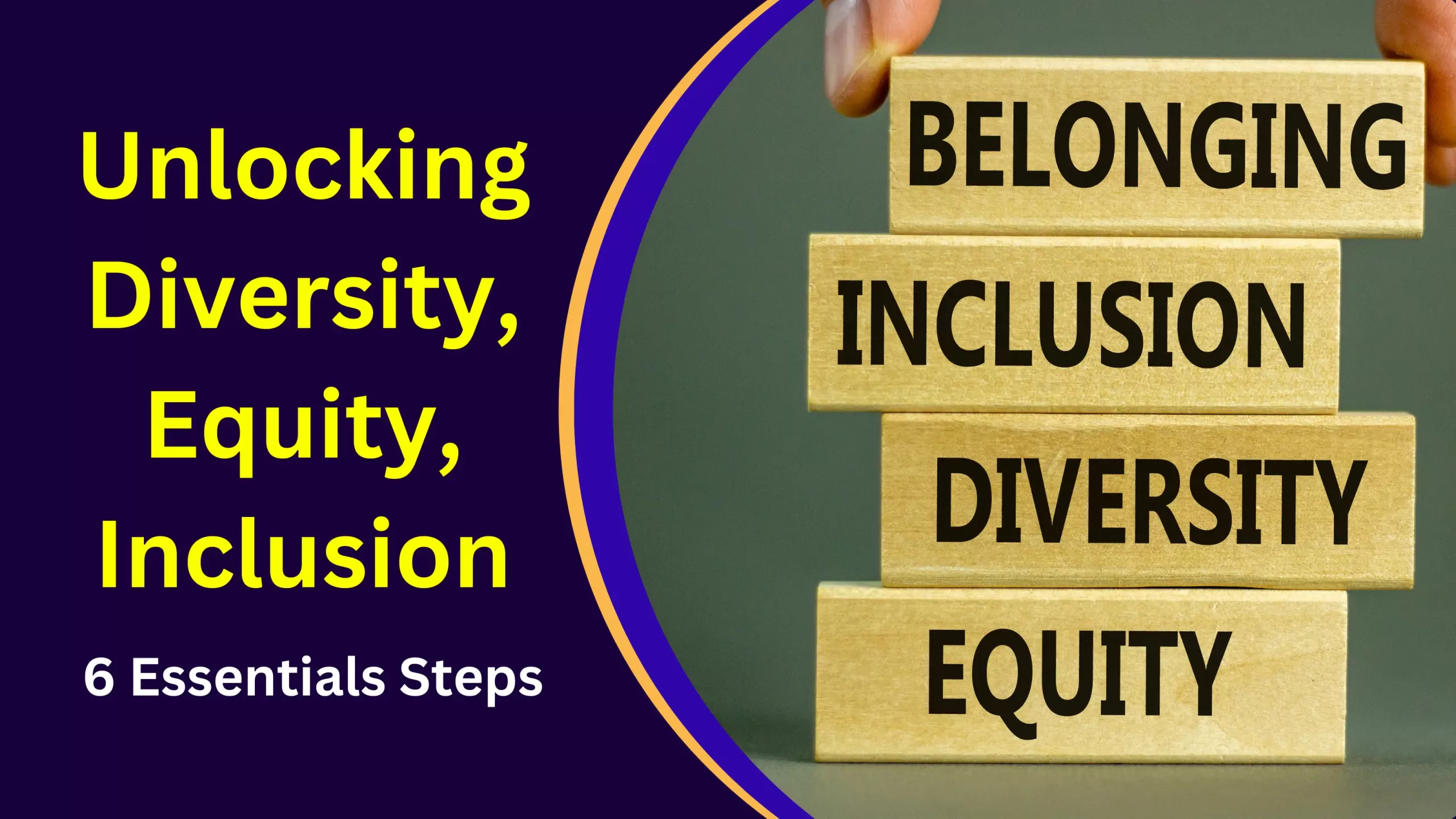Unlocking Diversity, Equity, Inclusion is imperative for organizational success. By committing to leadership, fostering inclusive cultures, and promoting equity, organizations can harness the full potential of their diverse workforce and drive innovation. Embrace diversity—it’s not just the right thing to do, it’s the smart thing to do.
Unlocking Diversity, Equity, Inclusion: 6 Essentials
In recent years, the call for diversity, equity, and inclusion (DEI) in workplaces, educational institutions, and communities has grown louder and more urgent. As society recognizes the value of embracing differences and providing equal opportunities for all, organizations are increasingly prioritizing DEI initiatives to foster environments where every individual feels respected, valued, and empowered. However, achieving meaningful progress in DEI requires more than just good intentions—it demands a strategic and holistic approach. In this article, we delve into six essential elements for unlocking diversity, equity, and inclusion in any setting.
Here is 6 Essentials Steps for Unlocking Diversity, Equity, Inclusion
1. Commitment from Leadership
True transformation in DEI begins at the top. Leaders must demonstrate unwavering commitment and champion the cause throughout the organization. When leaders prioritize diversity, equity, and inclusion, they set the tone for the entire workforce and signal that these values are integral to the organization’s culture and success.

Leadership commitment involves more than just issuing statements or policies; it requires proactive engagement, allocation of resources, and accountability mechanisms. Leaders should engage in ongoing dialogue with employees, listen to their concerns, and actively seek their input on DEI initiatives. Additionally, leaders must hold themselves and others accountable for upholding DEI principles and ensuring that they are integrated into all aspects of the organization’s operations.
2. Cultivating an Inclusive Culture
Building an inclusive culture is essential for creating a sense of belonging and empowerment among all members of the organization. Inclusive cultures embrace diversity and actively work to eliminate biases, stereotypes, and discriminatory practices.
To cultivate inclusivity, organizations should promote open communication, foster collaboration across diverse groups, and provide opportunities for all individuals to contribute and advance. This may involve implementing inclusive hiring practices, offering diversity training and education, and creating affinity groups or resource networks for underrepresented communities.
Moreover, organizations must be willing to challenge the status quo and confront systemic barriers that perpetuate inequities. By fostering a culture of inclusivity, organizations can harness the full potential of their diverse talent pool and drive innovation and success.
3. Equity in Policies and Practices
Achieving equity requires more than just treating everyone the same; it involves recognizing and addressing systemic inequalities to ensure fair and just outcomes for all individuals. Organizations must critically examine their policies, practices, and decision-making processes to identify and rectify areas where inequities exist.
This may involve conducting equity audits to assess the impact of policies on different demographic groups, implementing fair and transparent hiring and promotion practices, and providing equitable access to resources and opportunities. Additionally, organizations should actively seek to remove barriers that disproportionately affect marginalized communities and ensure that all individuals have the support they need to thrive.
4. Diverse Representation
Representation matters. When individuals see people who look like them in leadership positions and decision-making roles, they are more likely to feel valued and empowered. Organizations must prioritize diverse representation at all levels, from entry-level positions to the boardroom.
This requires intentional efforts to recruit, retain, and promote individuals from underrepresented backgrounds. Organizations should establish diversity goals and metrics to track progress, implement targeted recruitment strategies to attract diverse candidates, and provide support and mentorship programs to help diverse employees advance in their careers.
Furthermore, organizations should actively seek out diverse perspectives and voices in decision-making processes to ensure that a variety of viewpoints are considered and valued.
5. Ongoing Education and Training for Unlocking Diversity, Equity, Inclusion
Creating a truly inclusive environment requires continuous learning and growth. Organizations should invest in ongoing education and training programs to raise awareness of DEI issues, challenge biases, and foster cultural competence among employees.
These programs may include workshops, seminars, and interactive training sessions on topics such as unconscious bias, microaggressions, and inclusive leadership. Additionally, organizations should provide resources and support for employees to engage in self-directed learning and development opportunities.
By equipping employees with the knowledge and skills to navigate diverse environments respectfully and effectively, organizations can foster a culture of understanding and empathy.
6. Measuring Impact and Progress for Unlocking Diversity, Equity, Inclusion
Finally, organizations must measure the impact of their DEI initiatives and track progress over time. This involves collecting and analyzing data on diversity representation, employee experiences, and outcomes to identify areas of improvement and inform decision-making.
Key metrics may include employee demographics, representation in leadership positions, employee satisfaction and engagement scores, and retention rates among diverse groups. By regularly assessing progress and holding themselves accountable, organizations can identify gaps and opportunities for growth and demonstrate their commitment to diversity, equity, and inclusion.
In conclusion, unlocking diversity, equity, and inclusion requires a comprehensive and sustained effort from organizations at all levels. By committing to leadership, cultivating an inclusive culture, promoting equity in policies and practices, prioritizing diverse representation, investing in education and training, and measuring impact and progress, organizations can create environments where every individual feels valued, respected, and empowered to succeed. Embracing diversity, equity, and inclusion is not only the right thing to do—it’s also essential for driving innovation, fostering creativity, and building a more just and equitable society.
Read More Empower Your Mind: The Ultimate Guide to Personal Development
Visit Our Another site https://bn.thelearninghaven.com/

